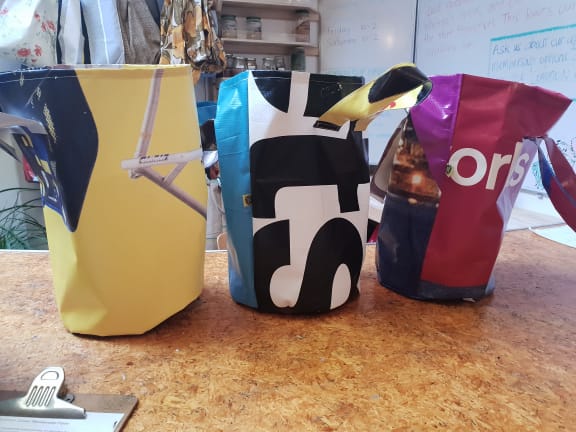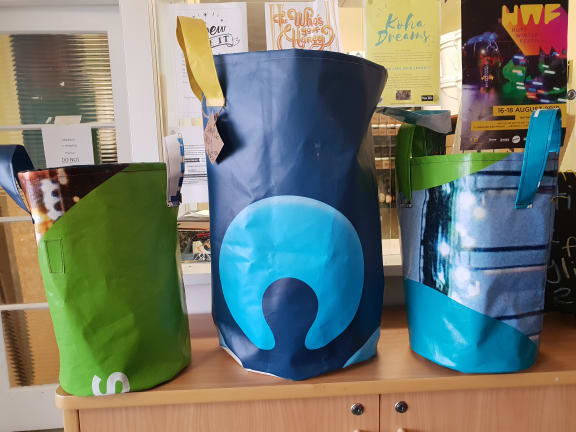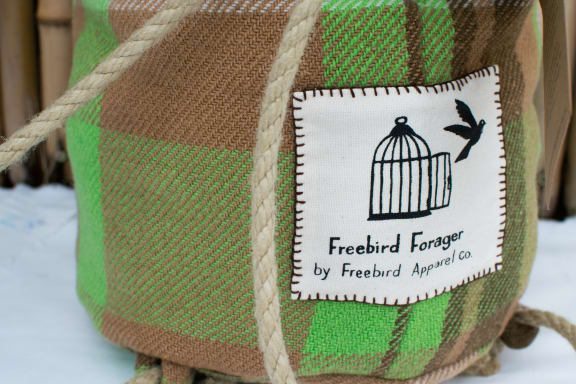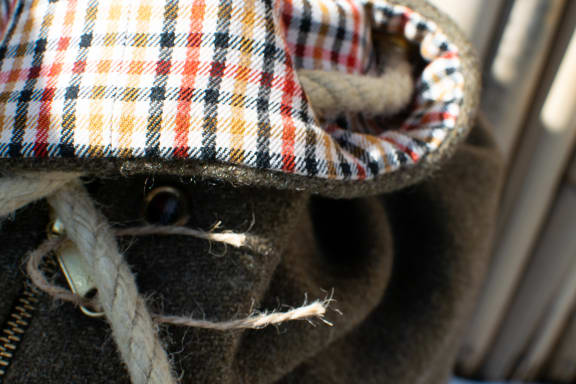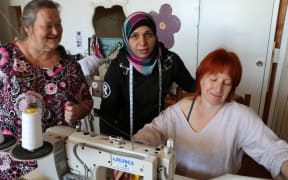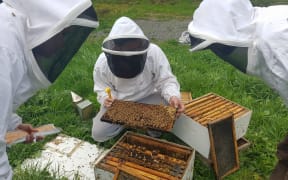The Sew Good Cooperative is making bin liners from rescued advertising banners, which would otherwise be bound for the tip.
It's one of 21 creative ideas rolling out of the workrooms at the Common Unity Project Aotearoa.
All the projects here are run by the local community, based at the Remakery in Lower Hutt.
Julia Milne tells Nine to Noon's Lynn Freeman the co-operative started with the idea of having the community come together to feed the children of Epuni School.
"What we figured pretty much right at the get go that it’s so much more than just a pot of soup to feed a child, that we needed spaces and places for the community to come together and do things together.
"We had the opportunity to take over an old plaster factory about ... 18 months ago and we’ve been merrily throwing open the doors and inviting the community to just come, make, explore this idea.
"We opened a food co-operative, the common grocer, 12 months ago - to the day almost ... That’s this amazing little shop that’s run by the community in response to the fact that we live in a food desert where we are in Waiwhetu Road.
"We wanted to have a go at having a cooperative that could not only provide dirt cheap dry goods and locally grown produce to the community but do it in a way that was entirely plastic free."
That plastic-free grocery led to efforts to create and provide plastic-free containers for the locals.
"So people can either buy their own plastic-free solutions from us - containers and bags and wrappers and things - or they can come and make them if they have more time rather than money.
"We have a textile library that fills up with donations from the community and at the moment there’s probably 2 1/2 tonne of textile sitting in that library."
She says some of what's supplied is used advertising billboards, which are made of a strong PVC - ideal for making bin liners.
"The actual putting it together probably takes about 45 minutes and because we pay a living wage to our contract sewers - that’s a really important part of our business model - that’s what sets the price at about the $25 mark.
She says they rinse out very easily and so can be reused again and again.
"It is too pretty, that’s why I don’t put mine in a bin, and a lot of people aren't even using bin liners anymore.
"It is very robust and it’s not necessarily for lining your bins, I take mine to the supermarket and fill mine up with groceries."
Prison blanket duffel bags
As well as the bin liners, one of their other big projects at the moment is making duffel bags out of prison blankets to help fund the growing of kai at Rimutaka Prison.
"We work quite collaboratively with Rimutaka prison, and we work with five different units up there, we’re growing prodigious amounts of food with the men - there’s about two and a half tonne of food this year alone that’s come out," Milne says.
"They gave us this stack of old prison blankets and that immediately ignited something for me being the child of a prison officer and I had one of these on my bed when I was growing up.
"So these have been decommissioned now, these blankets, and I just thought what a wonderful opportunity to fund our work that we’re doing up there, by creating a really high-end. limited edition, bag.
"Every one is bespoke, and is slightly different. They have these beautiful side pockets to put your cell phone and your headphones."
She says the bags and the growing of food is something the men at the prison have really responded to.
"A lot of them have come through that experience of being the hungry child.
"The amount of heart and effort they put into their mahi around growing food with us is pretty extraordinary."
The cooperative this week has also had a kitchen delivered, run entirely on solar power, which will act as the cooking centre for all the food produced to be turned into meals for hungry children.
"Looking at how we’re funding our work and the issue of sustainability all kind of entwines for us so it’s really important we innovate," Milne says.
Sew Good's Syrian, Malaysian and Pasifika Mamas
Building, cooking, growing, and especially sewing... Wellington's Sew Good Cooperative and their global mamas from Syria, the Pacific and Indonesia tell Lynda Chanwai-Earle why it takes a village to… Audio, Gallery
Bee daddies: Hutt Valley’s taste of honey
Kathryn Ryan talks to Julia Milne about the Beeple Honey Collective. Based in the Hutt Valley, a group of local dads are making hives from recycled wood that customers can rent or buy to have in their… Audio, Gallery
